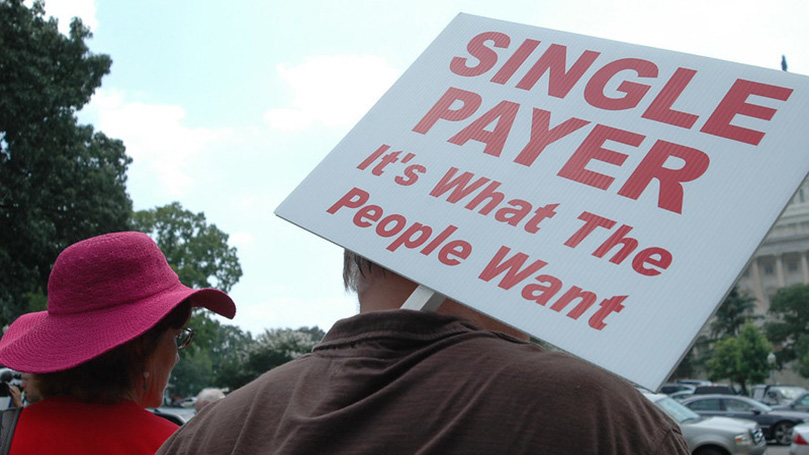
The following is a response to an article by Flavio Casoy, MD, about the proposal by the Eastern Pennsylvania/Delaware District for strengthening the Party’s position on healthcare.
To begin, we wish to thank Dr. Flavio Casoy for his thoughtful response to our healthcare proposal. Here, we would like to highlight points of agreement and provide clarity to a few points of disagreement. We also wish to clarify our points regarding healthcare workers who pursue business degrees and the role of advanced practice practitioners (APPs)/non-physician practitioners (NPPs). We apologize for the use of overly hostile language.
Our original proposal does not call for abandoning or discarding the ACA, but to contextualize that historical struggle and recognize the present opportunity to advance greater and more necessary reforms. In the foreword to Benjamin J. Davis Jr.’s Communist Councilman from Harlem, former Chairman Henry Winston notes,
Even the reforms won by struggle could be misused and made to serve the system of exploitation unless constant vigilance and ever new struggles were maintained by the masses. Nevertheless, Ben saw no need for a contradiction between the struggle for reform and the struggle for revolutionary change in the basic structure of our society. He looked upon every democratic victory won by the masses as a means of gaining greater mass power for still greater struggles against the exploiters. . . . But to accomplish this it would be necessary to imbue the masses with the perspective of revolutionary change. That is why he was a staunch and devoted Communist, who always believed in the indispensable role of this party as a revolutionary force.
We are in complete agreement that it is necessary to defend the gains provided by the ACA against the ultra-Right. Yet, public support for healthcare reform has advanced since passage of the ACA. The limitations of the ACA and the failures of our current healthcare system exposed by the COVID pandemic provide an opportunity to shift our emphasis to the struggle for a single-payer, universal Medicare For All system while simultaneously advocating for more revolutionary change. For example, organizing progressive forces to pass needed reforms like H.R. 1976, the Medicare For All Act of 2021, and H.R. 3, the Elijah E. Cummings Lower Drug Costs Now Act, does not mean we cannot also advocate and organize for nationalization of the pharmaceutical industry. Our proposal calls on the Party to take up that indispensable role as a revolutionary force.
Dr. Casoy also correctly notes that our proposal is incomplete in its analysis of the impact of educational debt on medicine’s unrepresentativeness, selection of medical specialty, and pay discrepancy between specialties. Our proposal outlines some of the factors involved but was not meant to be comprehensive. A healthcare working group could provide additional analysis that would be helpful in strengthening the Party’s policy positions and building progressive coalitions needed for these and other related issues.
The points made about individuals who pursue joint medical/business degrees and nurse practitioners and physician assistants were to lament the corporate takeover of medicine and the general acceptance within American society that healthcare is a business. It was not an attack on individual clinicians. APPs work with and provide care to members in our own club and district. We know them to be as passionate, smart, and dedicated as any other healthcare worker. We echo Dr. Casoy that we are thankful for their work. Our proposal said nothing to the contrary.
Recognizing that healthcare professionals have different but complementary education, training, and experience does not minimize APPs’ intellectual capability or commitment to providing patient care. They play an important role as part of a collaborative and interdisciplinary team. We only argue that they are not interchangeable with physicians. Our proposal meant to highlight an alarming trend within medicine of the equivalency of APPs and physicians that is argued by professional organizations like the American Association of Nurse Practitioners.
Corporate interests and the 1% make decisions that impact the public’s access to healthcare and healthcare workers themselves with profits and cost cutting in mind. Hospitals are being closed and physicians are being replaced as a result. A recent example is the closure of Hahnemann Hospital here in Philadelphia. Hahnemann was crucial to providing care to low-income patients for many years. The private-equity firm that bought and subsequently closed the hospital plans to sell it for the construction of luxury condominiums. Another example is the termination and replacement of 27 pediatricians with nurse practitioners at primary-care clinics in Dallas when clinics were bought by new management in 2018. Similar decisions are likely to continue in the future.
This issue, like many others in healthcare, reflects the structural incentives confronting community and public health agencies. Current reimbursement rates are not enough to cover costs, and much-needed resources are lacking. This is especially true in poorer and underserved communities.
We join Dr. Casoy in his call not to let the perfect be the enemy of the good. Reforms such as H.R. 1976 and H.R. 3 are vital and should have our full support. The Party can organize to help with their passage. Yet, additional reforms are necessary, including to medical education and training, work hour limitations for healthcare workers, safe nurse staffing levels, pay discrepancy, and equitable, unrestricted, and unconditional access to all preventative, reproductive, gender-affirming, and mental health services.
A practical step the Party can take as it formulates policy positions on healthcare is to form a healthcare working group. We hope interested comrades will join together to discuss present and future challenges, provide education to the Party, and help “imbue the masses with the perspective of revolutionary change” while building new coalitions to achieve true equity in healthcare.
Image: Public Citizen (CC BY-NC-SA 2.0).


 Join Now
Join Now